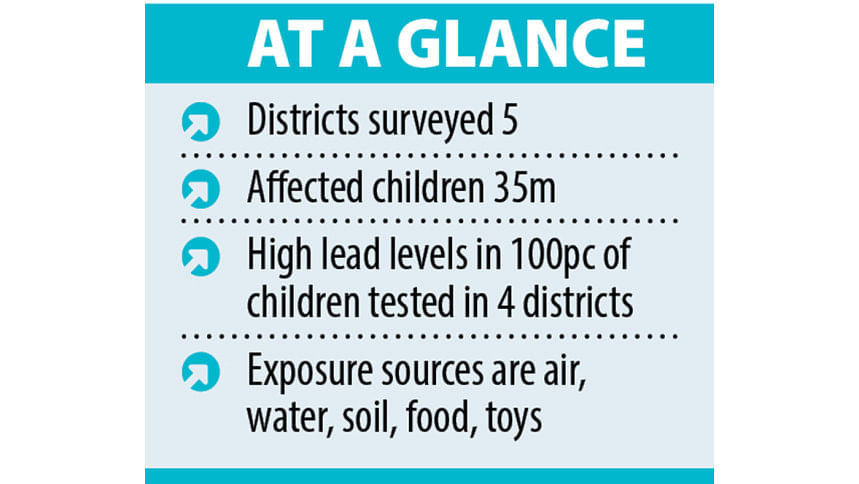Bangladesh ranks 4th globally

Bangladesh ranks fourth in the world for lead pollution affecting children, according to recent research by Unicef, the Institute of Epidemiology, Disease Control and Research (IEDCR), and icddr,b.
As many as 35 million children have hazardous levels of lead in their blood, adds the study.
This data was presented yesterday at a national workshop jointly organised by the Ministry of Environment, Forest and Climate Change and Unicef at the BICC auditorium in Dhaka, marking International Lead Poisoning Prevention Week.
The event, titled "Stakeholders Workshop on Heavy Metal Source Identification Linked to MICS 2024-25 and Broader Perspective," aimed to address lead contamination and explore urgent interventions.
Lead was detected in all 980 children tested across Khulna, Tangail, Patuakhali, and Sylhet, as well as in over 500 children in Dhaka. Of these, 40 percent in the four districts and 80 percent in Dhaka exceeded the World Health Organization's safety threshold of 5 microgrammes per decilitre.
Experts at the workshop described lead poisoning as a critical environmental health issue in Bangladesh, particularly for children who are highly vulnerable.
They said rapid urbanisation and industrialisation have worsened the contamination of air, water, soil, food, and household items like toys, paints, and cookware, further increasing exposure to toxic heavy metals.
Environment Adviser Syeda Rizwana Hasan pointed at the lack of adequate facilities in Bangladesh to measure and mitigate the impact of lead exposure on public health.
"No level of lead exposure is safe," said Rizwana. "A proper screening process, reinforced regulations, clear guidelines, and the necessary resources must be put in place to address this crisis," she added.
Rizwana also reiterated the interim government's commitment to a lead-free Bangladesh by 2040. She urged stakeholders at the workshop to actively contribute to a national action plan to identify and address the sources of lead contamination.
Unicef's Representative to Bangladesh, Rana Flowers, highlighted that children face lifelong, irreversible health impacts from lead exposure, affecting brain development and multiple organs.
She said in adults, lead poisoning is linked to cardiovascular disease and affects unborn babies during pregnancy. "Clear laws and private sector involvement can greatly reduce health and education costs, as well as the personal toll on women and children," she added.
Dr Mahbubur Rahman, assistant professor at IEDCR, said accurate, comprehensive data on children's health, education, and sanitation is vital for identifying sources of heavy metal contamination and for crafting effective interventions.
"Robust national data can drive policy reforms, setting the foundation for a lead-free future in Bangladesh with safer industry practices and lead-free products," he said.
In June, the Bangladesh Bureau of Statistics and Unicef launched the Multiple Indicator Cluster Survey Round 7 (2024-2025), funded by USAID.
This edition introduces new methods for collecting data on blood lead levels and other toxic metals, marking the first comprehensive attempt to assess toxic metal exposure in children.

 For all latest news, follow The Daily Star's Google News channel.
For all latest news, follow The Daily Star's Google News channel. 



Comments